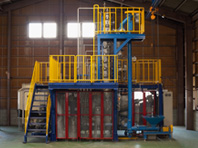What is waste plastic oil conversion?
Turning waste plastic into oil again.
Turning waste plastic into petroleum raw material(Naphtha).
We aim to create a recycling-oriented society with reliable oil conversion technology.
Waste plastics recycling into oil by HiCOP method

Waste plastic oil processing equipment
『HiCOP-2000』
In addition, since waste plastic can be continuously fed, the operating rate of the equipment has increased, and since the pipes are not blocked by wax, maintenance work has been significantly reduced, and running costs have also been reduced.
Using this catalytic oil conversion technology (HiCOP method), we aim to commercialize waste plastic oil conversion and spread a new recycling culture both domestically and internationally.
RE:OIL

“Turning waste cooking oil and biomass into high-quality biofuel” (HiBD Institute)
RE:OIL is an activity proposed by the general incorporated association HiCOP Institute/HiBD Institute, which aims to spread a new recycling culture.Our company supports this initiative, which aims to promote the effective use of discarded garbage, promote the recycling of resources, and create a recycling-oriented society that is both business and economical and sustainable.
What is waste plastic oil conversion?
 As you know, plastic is made from petroleum.
As you know, plastic is made from petroleum.
“Converting waste plastic into oil” is a type of recycling called “chemical recycling,”in which waste plastic is chemically processed and turned into oil, which is a raw material.
Japan's plastic waste conversion process, which began in the 1970s, has evolved with the continuous efforts of pioneers. However, although the recycling rate of waste plastic in Japan has reached 80%, the majority is called “thermal recycling” (53%), excluding “material recycling” (22%), which is reused as recycled plastic. The purpose of waste is to use it as a heat source during incineration, and it is a one-time recycling process that involves waste power generation, heat utilization incineration, and processing into solid fuel and incineration as is. Chemical recycling, such as turning it into oil, accounts for only 3%.
Recycling plastic waste from ordinary households, which contains a mixture of different types of plastics, is difficult and has long been avoided due to technical and business profitability reasons.
However, the HiCOP type oil converter, which uses a catalytic method, is a new technology that produces oil with a yield of over 80% based on the input waste plastic, and is highly safe. The quality of the oil produced has improved dramatically.
We confidently recommend this system as a future waste plastic oil conversion system that will create a better recycling-oriented society.
Possibility of recycling througn oil conversion
The possibility of converting plastics into oil is about to reach a new stage with the new technology “HiCOP method.”
The amount of plastic thrown away without being recycled is 2.12 million tons annually. If this were all converted into oil, it would amount to approximately 2.12 million kiloliters (calculated assuming that 80% of the input weight of waste plastic becomes oil in the HiCOP method, and the specific gravity of the resulting oil is 0.8), which is equivalent to Japan's crude oil consumption. This is equivalent to approximately 3 days worth of food. (Reference to Ministry of Foreign Affairs “BP World Energy Statistics 2013”)
The amount of waste plastic that is thermally recycled is approximately 4.96 million tons annually. (Refer to the Plastic Recycling Association)
In order to create a recycling-oriented society, our company will continue to conduct research in order to increase the amount of material recycled.

Used waste plastic is turned back into oil and reused.
Aiming to create a recycling-oriented society through “oil conversion.”
This is the new form of oil conversion that Environment Energy Co., Ltd. is aiming for.




